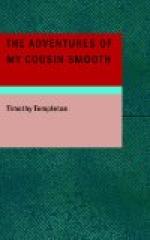he would when excited frisk across the polished crown
of his head. His great hobby was his knowledge
of diplomacy. And, too, he was forever talking
about the affairs of the nation, and would not unfrequently
get put out with the whole parish, because it withheld
from him, he said, that deference his experience was
entitled to. He had, many years ago, been in some
way attached to the diplomatic corps, which he ever
after regarded with a sort of religious awe; and whenever
a strange fit came over him he would do something
he said was to prop up its dignity, of which none
could be more jealous. I have, known him declare,
that to maintain untarnished the character of the
polite corps, he would swear by its virtue and his
crutch. He would not have it held in suspicion
by the vulgar world, and would go straight into a fit
of sickness at the news of one its members doing aught
to sully the fair name he described it as possessing.
Sometimes I thought my great-uncle had been attached
to some foreign mission in the mean capacity of butler,
or footman, for he was scrupulous of his bow, had an
excellent taste for wine, and would spend much valuable
time in bringing to light and brushing, and then putting
carefully away again, certain velvet inexpressibles
of great brightness, and richly embroidered waistcoats,
of wonderful length. ‘These,’ he would
say with an air of exultation, ’have a mysterious
but mighty influence in changing and directing the
affairs of powerful nations.’ He had also
a boyish fondness for displaying a lithograph of the
Countess Hopenpap’s family arms, presented,
he said, by that august lady to the legation, of which
he had the honor of being a member, and from thence
stolen by Thomas, footman in ordinary to the establishment.
For this heinous offence, Thomas, though his knowledge
of etiquette was invaluable to the mission (the gentlemen
up stairs always fashioned their bows after his!),
was discharged, having been detected in the act of
offering it for sale at the counter of a dealer in
old clothes.
“On the other hand, there was that about my
great-uncle which completely overthrew the suspicion
of his having been a kitchen diplomatist: he
was an excellent judge of dancing, and what stronger
evidence of his forming one of the polite body up-stairs,
does the reader want? In addition to this,—he
not only discoursed glibly about diplomacy, but sagaciously
gave out that he would turn his back to no one in
his knowledge of treaties; which said knowledge, and
his crutch, he was always ready to swear by.
Those great brass buttons with the eagles, and his
blue small clothes, too, he wore to the day of his
death. The parish had a feeling that no fourth
of July could be celebrated without him; and I well
remember how on that day I used to think him rather
too fond of laying his crutch over the heads of all
who differed with him on a question of state policy.
My readers will please understand that I have no particular
interest in raising the question as to whether my




